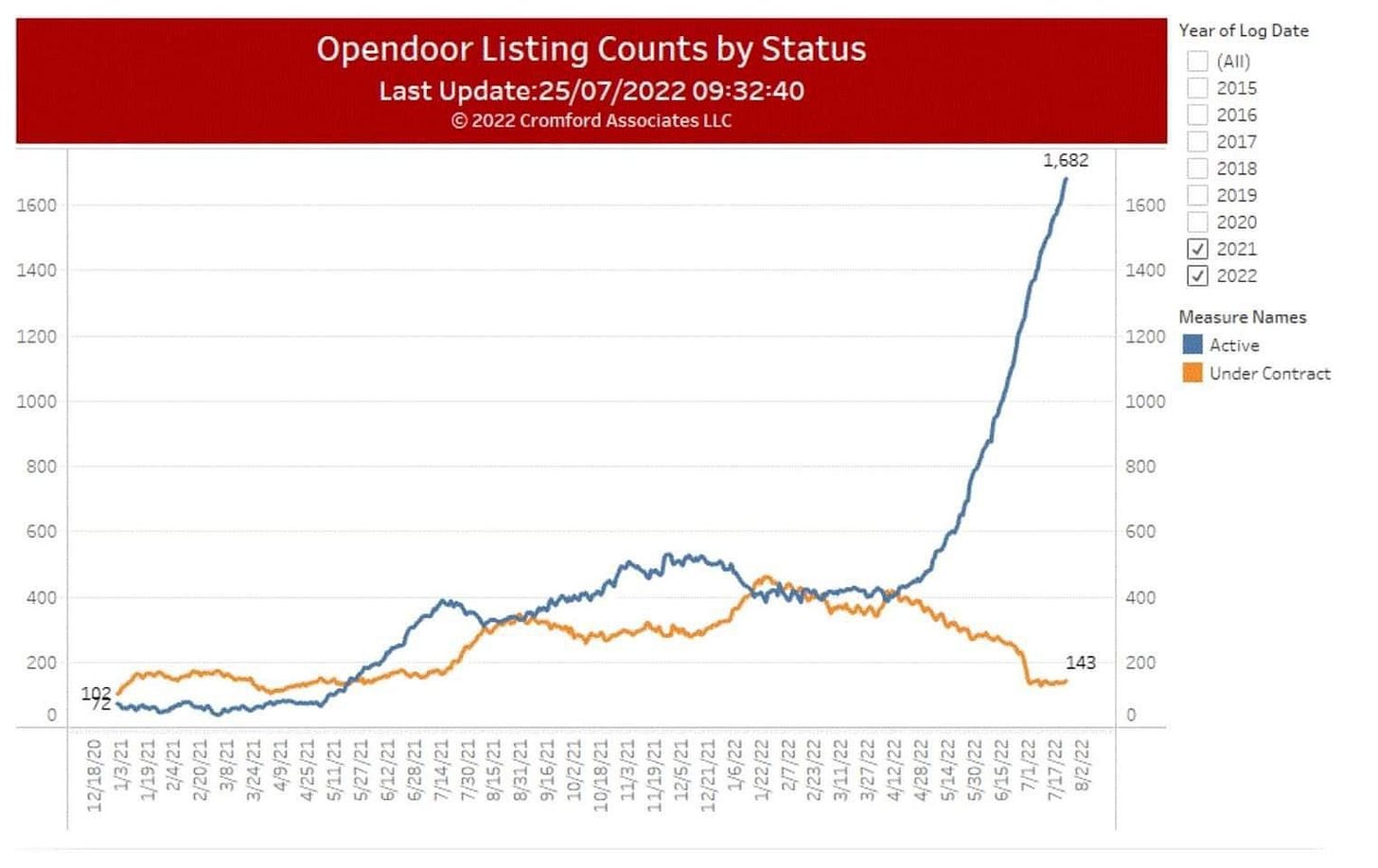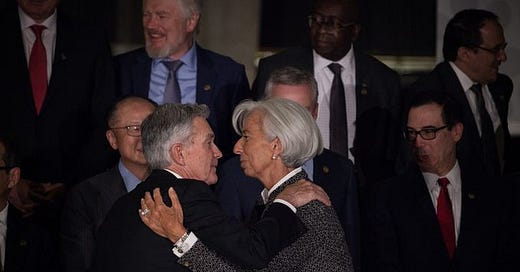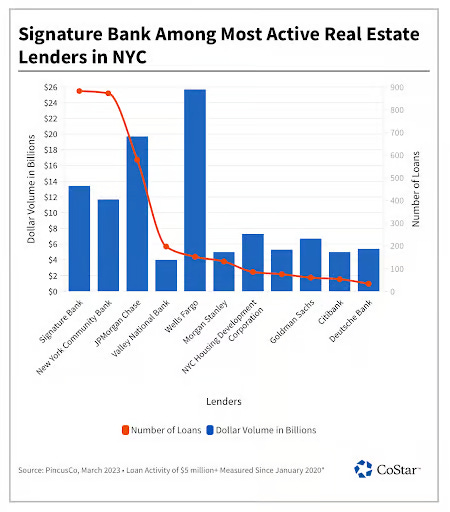True stories could fuel hesitancy...
I'll find a place inside to laugh, Separate the wheat from the chaff
The first panacea for a mismanaged nation is inflation of the currency; the second is war. Both bring a temporary prosperity; both bring a permanent ruin.
But both are the refuge of political and economic opportunists.
- Ernest Hemingway, Notes on the Next War
Exclusive Video of the Silicon Valley Bank Run:
Think it’s gonna be different this time
Not like the last
Warren Buffett in discussions with Biden officials on banking crisis
The Fed-shill apology tour has begun:
The Fed repeatedly warned the bank that it had problems, according to a person familiar with the matter. [Probably anonymous sources with close ties to U.S. intelligence - RH]
I should note that the above article was written by Jeanna Smialek, who - you’re not going to believe this - has a brand new book out, some fan fiction titled: Limitless: The Federal Reserve Takes on a New Age of Crisis.
One of the most absurd aspects of the Silicon Valley bank failure is that its CEO was a director of the same body in charge of regulating it.
- Bernie ‘I Surrender’ Sanders [Hey Bernie - take a look at the 2008 NY Fed Board]
I’ve noticed Jeanna in the past for her hard-hitting questions like this one:
It’s not just the NY Times.
Here are the top two Wall Street Journal Fed reporters' latest books:
These people are NOT journalists - they're PUBLICISTS! Who is tough on the Fed in the MSM? No one.
They all LOVE the Fed, otherwise they wouldn't be Fed reporters.
I never see reporters more obsequious and deferential than when they're questioning FOMC members.
The Fed has immense power over all of us, and this is a national disgrace.
After lunch, at Michelle’s1 request, I took calls from reporters. If we were going to hold our own in the court of public opinion, we needed to get our side of the story out. Generally, I spent the most time with the beat reporters who wrote regularly about the Fed, including Jon Hilsenrath of the Wall Street Journal, Greg Ip of the Economist, Krishna Guha of the Financial Times, Neil Irwin of the Washington Post, John Berry of Bloomberg, Steve Liesman of CNBC, and Ed Andrews of the New York Times. I knew that these more specialized reporters were best equipped to understand and then explain what we were doing and why. Other media would pick up on their reporting.
- Pimco-Intern Ben Bernanke, in his fantasy novel, The Courage to Act in My Own Best Interest
Jackson Hole, 2022. The Kansas City Fed wants propagandists, not serious journalists.
…although the Bank receives numerous requests from media outlets worldwide, press attendance is also limited to a group that is selected to provide important transparency to the symposium, but yet not overwhelm or influence the proceedings.
Here’s another typical mainstream-media Bernanke tongue-bath from Martin Wolf in 2015:
The waitress takes our orders. I choose pan-seared swordfish with fingerling potatoes, onions and Brussels sprouts. He selects grilled halibut with green beans, blue cheese and mashed potatoes.
Martin Wolf is like a brain-damaged Tom Friedman.
On the other hand, WSJ’s Jonathan Weil seems to have figured it out ahead of most, as Jesse Eisenger2 reminded me. From November 11, 2022:
SVB Financial Group, the parent of Silicon Valley Bank, said the market value of its held-to-maturity bonds was $15.9 billion less than their balance-sheet value, as of Sept. 30. That gap was slightly more than SVB’s $15.8 billion of total equity. SVB’s chief financial officer, Dan Beck, said in an email, “There are no implications for SVB because, as we said in our Q3 earnings call, we do not intend to sell our HTM [held to maturity] securities.”
But it’s not just the mostly abysmal MSM. Where's today's Ron Paul? No one in Congress is seriously challenging the Fed.
A few give it a hard time only because they want the infinite fun coupons directed their way [e.g., poser Liz Warren.] And where are you, Senator Sanders?
Congress is so corrupt they've completely abdicated everything to the Fed.
I’m not saying you're self censoring.
I’m sure you believe everything you’re saying.
But what I’m saying is that if you believed something different,
you wouldn’t be sitting where you’re sitting.
I have not seen this yet, but plan to ASAP.
Frontline has a history of doing excellent financial crime documentaries over the years, way above average for a mainstream outlet: The Age of Easy Money.
Free people: This is another big post today. The above is stuff just the foam of the beer. You’re also missing out on all my incredible hot stock tips guaranteed, to triple overnight. Also I’ll be shilling crypto coins. [Note to SEC Enforcement: I’m kidding]
I think calling Powell the “Destroyer of Hooms” is a bit much, even for Reddit.
Jerome Powell became the most powerful person on Earth in February 2018, so, to be fair, whoever posted the above should STFU and thank Powell for making them and many private-equity billionaires quite happy (homes up 50% on average nationally, even after the recent unpleasantness).

Looks like OpenDoor bonds have a juicy yield:
Credit Suisse Disaster Zone
Re: Any UBS/Credit Suisse “merger”:
It’s always the worst people who get bailed out.
I always love seeing the staid Financial Times [e.g., in October 2022] lowering their standards to call out “Reddit degens,” “messageboard polymaths,” and “the shitposters” for scaremongering about Credit Suisse: e.g., “a CDS with a 2 handle is quite high but nowhere close to “imminent default” high”.
Speaking of “scaremongers”: The market is on the verge of a Lehman-style event as the financial world thrashes in the wake of global banking turmoil, veteran trader Art Cashin says
Actually, “Markets Insider” (formerly known as Clusterstock, right? How’s Infospace doing?), I’m not sure that’s exactly what Art said.
The lady doth protest too much, methinks.
You will note(!) that in the OCC Q3 2022 Quarterly Report on Bank Trading and Derivatives Activities Credit Suisse has a mere $186 Billion in total derivatives - peanuts! For example, completely safe and competent bank Citigroup had $47 trillion in derivatives, but that’s NOTIONAL, which means everything is FINE, because all counterparties will always be solvent. This is settled science (and if not, the Fed is always there to bail out the very, very, very wealthy.)
"The risk is in the gross, not the net." - Jim Rickards, on derivatives
From a December 2022 BIS Paper: Dollar debt in FX swaps and forwards: huge, missing and growing
FX swaps, forwards and currency swaps create forward dollar payment obligations that do not appear on balance sheets and are missing in standard debt statistics. Non-banks outside the United States owe as much as $25 trillion in such missing debt, up from $17 trillion in 2016. NonUS banks owe upwards of $35 trillion. Much of this debt is very short-term and the resulting rollover needs make for dollar funding squeezes. Policy responses to such squeezes include central bank swap lines that are set in a fog, with little information about the geographic distribution of the missing debt.
Credit derivatives house of the year: Credit Suisse
Tiger Global Writes Down Venture Funds’ Bets by 33% in 2022 As Shrub suggested:
"If Blackstone REIT is 'mark to myth', then the venture capital funds are 'marked to fraud' almost, right?"
Some anecdotal color on the Denver cannabis CRE market:
Seeing softness in Denver. A lot of spec built off I25 is still empty and it has been over a year. They are big box tilt ups. Also the cannabis industry is ailing and I project 50-70% of legal cannabis businesses will shut down in the next year at least out west in mature markets. Good to hear that things are still filling up in other areas. I focus on retail now but keep up with industrial since that has been the bulk of my sales.
Q: Are the cannabis businesses failing because the market is saturated? Do many use large warehouses for growing at all?
That is part of it. Spot price per lb is around 400 and it used to be 1200 and 10 years ago it was 2000+. The main problem on that end is California will not shut down the legacy market or issue enough licenses for the legal ones to compete. Then you have the tax situation. Since they are selling a federally illegal substance they fall under 280E which is a 90% tax. Not an issue for black market opps because they do not report their income to the feds. There are ways to write it down but most are just lucky to break even at this point. Everyone that got into this business thought it would be repealed by now and they would have unfettered banking access, but the reality is there will never be federal legalization or even banking reform. Denver has some purpose build facilities with mixed light and indoor grows in our class C. It has propped up the industrial market since it was legalized here so not sure what will happen when the other shoe drops. I am leaving a lot out but my fingers are tired.
What Signature Bank's Demise Means for NYC
Some good stuff below, from a Reddit degen Gamestop board, of all places!
The 2023 Real Estate Crash Started 5 Months Ago - and it Just Took Down its First Banks REIT investors take note.
this is the new thing this time around, which is only just starting to blow up, and is the single largest bubble in history. Yes, bigger than the tulips, the gold rush, the '29 and tech bubbles combined….
“You couldn't make this stuff up if you tried. Those two charts literally show the debt getting BETTER/SAFER ratings as the amount unsecured increases. F****** unbelievable.”
Today, U.S. REITs own nearly $4.5 trillion of gross real estate with public REITs owning $3 trillion in assets.
Yes. that's right. $4.5 TRILLION of overvalued property assets. Across every single property asset class, housing, commercial, medical, farmland, timberland, offices, retail, data centers, you name a kind of real estate, these things are in on it. Much like a mortgage backed security, or a stock or a bond or anything else, REITs are not inherently bad for investors or bad for society. What is f****** terrible is that they've grown wildly out of control and are heavily overleveraged on wildly overvalued assets, to a degree unprecedented in human history, thanks largely to various Central Banks across the world overprinting.
Oh, and if you're wondering how they own $4.5 Trillion in real estate with only $3 Trillion in assets? The difference is made up by $1.5 Trillion in debt. Unsecured, investment grade debt.
In the late 1990’s, when people I knew who hadn’t heard of stocks six months earlier were doubling their money twice a week on stuff like JDS Uniphase (Or “Just Don’t Sell Us,” as serial destroyer of investors Jim Cramer would say), I was paying down debt, buying dirt-cheap REITs, and feeling really dumb. These REIT’s had single-digit PE’s, huge yields, good balance sheets, insider buying…they were actually cheap. I rode that wave out until the mid-2000’s, selling a year too soon (as usual), but before Great Depression II hit in 2008. Today’s REIT market is not like the late 1990’s.

Other things can have runs besides banks: LME finds bags of stones instead of nickel in metal warehouse
Pretty Much.
Tired of hearing people say solemnly, “The Fed is going to tighten until they break something.” Horrific Fed policies like QE and ZIRP and bailouts helped break things a long time ago.
Oh yeah, the bottom 90% is terrified of a lower cost of living.
"We've never had a deflationary bust because inflation was too close to zero, or 1.5% instead of 2% - we've had them because we've had these tremendous ASSET BUBBLES..." - Stan Druckenmiller
Walter Bagehot “recommended that during a panic the Bank of England should lend copiously against good securities and at a high rate of interest.”
…The Bagehot rule is much cited by monetary policymakers in the twenty-first century. After the 2008 global financial crisis, US Treasury Secretary Tim Geithner, a former President of the New York Federal Reserve, referred to Lombard Street as the ‘bible of central banking’. In his memoirs, The Courage to Act, Geithner’s former boss, Ben Bernanke, mentions Bagehot more frequently than any other economist. When Bernanke’s Federal Reserve and other central banks stepped up as lenders of last resort during the crisis, Bagehot provided the cover for their trillions of dollars’ worth of central bank loans.
Yet Bagehot’s stringent conditions were not followed. Modern lenders of last resort have only a tenuous connection with their Victorian antecedents. They do not lend at high interest but at the lowest rates. Their emergency loans are not provided for a short period, but for years on end. They do not lend against high-quality collateral but reach to the outer edges of the credit spectrum. Modern central bankers show far less concern for moral hazard than Bagehot – and their actions would give Thomson Hankey an acute case of neuralgia. They often cite deflation as a justification for extreme measures. Yet nowhere does Bagehot consider deflation to be a financial risk. It would be surprising had he done so, since the Victorian era was marked by long periods of mild deflation, punctuated by the occasional severe deflation witnessed during banking panics. Deflation that appears at such moments would have been seen as a symptom of credit sickness, the fever so to speak, rather than the cause of the sickness. In Bagehot’s description of the trade cycle, falling prices are part of the process of a return to normality.
Edward Chancellor, The Price of Time (Great book. If you want another, get this by Jim Grant)
So Balaji I think used to follow me, and I think this is an accurate representation of his current views:
I do not endorse the above views, nor do I think most of it is true (maybe Balaji does have 99% in Bitcoin), and the Civil War stuff is straight Noah Smith-type garbage.
It is important to note that hyperinflation is not very high inflation - it is a panic out of a currency. I don’t think that is “imminent” in the U.S.
I’ve written a lot about hyperinflation, why it’s the worst possible outcome for most, and why central bankers globally trying to use high inflation as a solution to horrific debt problems is VERY dangerous.
History tells us a lot about who wins and loses in hyperinflations. There’s a reason for my nom de plume.
Lenin is said to have declared that the best way to destroy the Capitalist System was to debauch the currency. By a continuing process of inflation, governments can confiscate, secretly and unobserved, an important part of the wealth of their citizens. By this method they not only confiscate, but they confiscate arbitrarily; and, while the process impoverishes many, it actually enriches some. The sight of this arbitrary rearrangement of riches strikes not only at security, but at confidence in the equity of the existing distribution of wealth. Those to whom the system brings windfalls, beyond their deserts and even beyond their expectations or desires, become “profiteers,'' who are the object of the hatred of the bourgeoisie, whom the inflationism has impoverished, not less than of the proletariat. As the inflation proceeds and the real value of the currency fluctuates wildly from month to month, all permanent relations between debtors and creditors, which form the ultimate foundation of capitalism, become so utterly disordered as to be almost meaningless; and the process of wealth-getting degenerates into a gamble and a lottery.
Lenin was certainly right. There is no subtler, no surer means of overturning the existing basis of society than to debauch the currency. The process engages all the hidden forces of economic law on the side of destruction, and does it in a manner which not one man in a million is able to diagnose.
John Maynard Keynes, The Economic Consequences of the Peace
I know it’s TMZ and Fox, but I may tape this tonight, since I’m unfamiliar with this story: 9/11: The Fifth Plane
Michelle Smith is Powell’s chief of staff, who has served every Fed Chair of the last 30 years in some capacity—Powell, Janet Yellen, Ben Bernanke, and Alan Greenspan, and who now basically runs the Fed (scary article, highly recommended).
Ubiquitous Fed uber-apparatchik Michelle Smith is also the one running the Powell press conferences. Maybe this is why we rarely see anything other than softball questions. Don't piss Michelle off or you might lose your access-journalist P.R. pass.



































The guy writing on the degen board is talented.
Dispatch from the front: https://twitter.com/basedmikelee/status/1637621276511485952?s=61&t=YbHCTKzSs8drbdOvhCVz0A